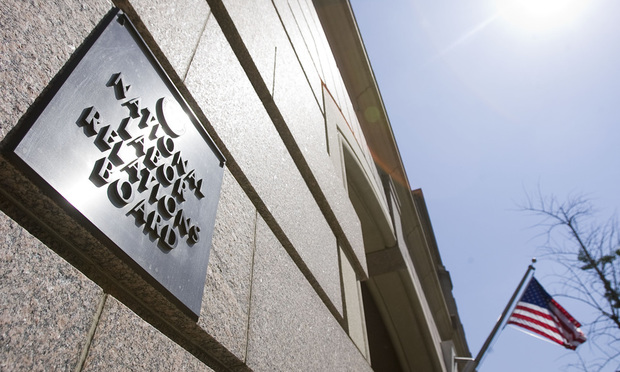Business Groups Urge NLRB to Restrict Employee Email Use on Company Systems
"The increasing pace of technological development and workplace innovation argues against the reactionary creation of new substantive rights," business advocates contend in new briefing at the National Labor Relations Board.
October 09, 2018 at 06:37 PM
5 minute read
 NLRB headquarters in Washington. Credit: Diego M. Radzinschi/ALM
NLRB headquarters in Washington. Credit: Diego M. Radzinschi/ALM
Business and management groups want federal regulators to prohibit employees from discussing workplace conditions and union activity on company-owned email, in case being weighed by President Donald Trump's National Labor Relations Board that confronts how technology clashes with labor law.
The advocates for business want the labor board to overturn Obama-era precedent that allows employees to use work email for communication about, among other things, workplace conditions and union-organizing activities. The business groups contend the use of email for those purposes is a “needless infringement on employers' rights.”
On the flip side, labor advocates, urging the NLRB to leave the precedent untouched, argue that electronic communication should be treated the same as chatter in the cafeteria and that restricting how email systems are used would be unwieldy and possibly discriminatory.
Both sides acknowledge the evolving modern workplace and that the labor board is being asked to reconcile the new ways employees communicate with decades-old labor law that protects speech and employers' property. The labor board indicated in its announcement soliciting briefs that it would consider all electronic communications in its decision, not just email.
➤➤ Get employment law news and commentary straight to your in-box with Labor of Law, a new Law.com briefing. Learn more and sign up here.
The Republican-led NLRB was divided over whether to begin taking a new look at these questions. The board, under the leadership of chairman John Ring, is revisiting the 2014 NLRB decision Purple Communications, which said employees can use company email for union-related communication.The NLRB is using the 2011 case Caesars Entertainment Corporation to consider these questions anew.
Major unions, business groups and others filed a host of amicus briefs in recent days, responding to the NLRB's call for views. Several of the groups, including the Center for Workplace Compliance, touched on whether the board's decision should extend beyond email communication and include other electronic forms of communication in the workplace.
A brief filed by the U.S. Chamber of Commerce and other big business groups, including the National Retail Federation, the American Hotel & Lodging Association and the International Foodservice Distributors Association, said prior to Purple Communications employees had no fundamental right to use employer equipment for protected union-related activity. Email should not be treated differently, McGuireWoods partner Seth Borden argued in the brief on behalf of the groups.
“To the contrary, the increasing pace of technological development and workplace innovation argues against the reactionary creation of new substantive rights, and in favor of continued application of a time-tested balancing test,” Borden wrote. “Yet against this backdrop, without any legitimate basis, Purple Communications upended well-established board precedent to create a new employee right to the employer's property.”
Borden said the NLRB's ruling in Purple Communications “has exposed employers to exponentially increasing, unnecessary risk.”
The AFL-CIO, meanwhile, told the NLRB that using company email for personal communications is “deeply-ingrained in the culture of virtually every workplace that has an email system and is often explicitly permitted by company rules.”
“Employers almost universally permit such use—whether by rule or de facto—because it allows employees to quickly and efficiently take care of personal business that might otherwise significantly disrupt the workday, because it fosters a sense of community in the workplace, and because the alternative of monitoring every employee email is simply too burdensome,” AFL-CIO associate general counsel Matthew Ginsburg wrote. “As a result, if the board were to hold that employers may bar company email use for Section 7 communications altogether, it would create a trap for the unwary while having little practical utility in terms of the day to-day management of the workplace.”
Ginsburg also argued that even with a blanket prohibition, employees would likely still use email for person use, and employers could face claims of discrimination if certain personal communication is allowed and union activity is not.
“Employers have little reason to strictly enforce a prohibition against employee emails seeking to sell cookies or raffle tickets for a scout troop or the local PTA or emails inviting employees to join a sports team or a local fraternal organization,” according to the AFL-CIO. “Again, if the employer were to seek to enforce such a rule against union-related communications, employees would have ample evidence of nonenforcement of the rule to support a claim of unlawful discrimination.”
U.S. Sen. Patty Murray, the ranking member of the Senate Committee on Health, Education, Labor and Pensions, also urged the board to uphold Purple Communications and allow workers to communicate with each other to discuss working conditions via email. “Workplace email is a 'natural gathering place' for the workers who use it, and employers may not silence their collective voices online,” according to Murray's brief.
This content has been archived. It is available through our partners, LexisNexis® and Bloomberg Law.
To view this content, please continue to their sites.
Not a Lexis Subscriber?
Subscribe Now
Not a Bloomberg Law Subscriber?
Subscribe Now
NOT FOR REPRINT
© 2025 ALM Global, LLC, All Rights Reserved. Request academic re-use from www.copyright.com. All other uses, submit a request to [email protected]. For more information visit Asset & Logo Licensing.
You Might Like
View All
Dissenter Blasts 4th Circuit Majority Decision Upholding Meta's Section 230 Defense
5 minute read
Justice 'Weaponization Working Group' Will Examine Officials Who Investigated Trump, US AG Bondi Says

Judge Pauses Deadline for Federal Workers to Accept Trump Resignation Offer

Judge Accuses Trump of Constitutional End Run, Blocks Citizenship Order
3 minute readTrending Stories
- 1States Accuse Trump of Thwarting Court's Funding Restoration Order
- 2Microsoft Becomes Latest Tech Company to Face Claims of Stealing Marketing Commissions From Influencers
- 3Coral Gables Attorney Busted for Stalking Lawyer
- 4Trump's DOJ Delays Releasing Jan. 6 FBI Agents List Under Consent Order
- 5Securities Report Says That 2024 Settlements Passed a Total of $5.2B
Who Got The Work
J. Brugh Lower of Gibbons has entered an appearance for industrial equipment supplier Devco Corporation in a pending trademark infringement lawsuit. The suit, accusing the defendant of selling knock-off Graco products, was filed Dec. 18 in New Jersey District Court by Rivkin Radler on behalf of Graco Inc. and Graco Minnesota. The case, assigned to U.S. District Judge Zahid N. Quraishi, is 3:24-cv-11294, Graco Inc. et al v. Devco Corporation.
Who Got The Work
Rebecca Maller-Stein and Kent A. Yalowitz of Arnold & Porter Kaye Scholer have entered their appearances for Hanaco Venture Capital and its executives, Lior Prosor and David Frankel, in a pending securities lawsuit. The action, filed on Dec. 24 in New York Southern District Court by Zell, Aron & Co. on behalf of Goldeneye Advisors, accuses the defendants of negligently and fraudulently managing the plaintiff's $1 million investment. The case, assigned to U.S. District Judge Vernon S. Broderick, is 1:24-cv-09918, Goldeneye Advisors, LLC v. Hanaco Venture Capital, Ltd. et al.
Who Got The Work
Attorneys from A&O Shearman has stepped in as defense counsel for Toronto-Dominion Bank and other defendants in a pending securities class action. The suit, filed Dec. 11 in New York Southern District Court by Bleichmar Fonti & Auld, accuses the defendants of concealing the bank's 'pervasive' deficiencies in regards to its compliance with the Bank Secrecy Act and the quality of its anti-money laundering controls. The case, assigned to U.S. District Judge Arun Subramanian, is 1:24-cv-09445, Gonzalez v. The Toronto-Dominion Bank et al.
Who Got The Work
Crown Castle International, a Pennsylvania company providing shared communications infrastructure, has turned to Luke D. Wolf of Gordon Rees Scully Mansukhani to fend off a pending breach-of-contract lawsuit. The court action, filed Nov. 25 in Michigan Eastern District Court by Hooper Hathaway PC on behalf of The Town Residences LLC, accuses Crown Castle of failing to transfer approximately $30,000 in utility payments from T-Mobile in breach of a roof-top lease and assignment agreement. The case, assigned to U.S. District Judge Susan K. Declercq, is 2:24-cv-13131, The Town Residences LLC v. T-Mobile US, Inc. et al.
Who Got The Work
Wilfred P. Coronato and Daniel M. Schwartz of McCarter & English have stepped in as defense counsel to Electrolux Home Products Inc. in a pending product liability lawsuit. The court action, filed Nov. 26 in New York Eastern District Court by Poulos Lopiccolo PC and Nagel Rice LLP on behalf of David Stern, alleges that the defendant's refrigerators’ drawers and shelving repeatedly break and fall apart within months after purchase. The case, assigned to U.S. District Judge Joan M. Azrack, is 2:24-cv-08204, Stern v. Electrolux Home Products, Inc.
Featured Firms
Law Offices of Gary Martin Hays & Associates, P.C.
(470) 294-1674
Law Offices of Mark E. Salomone
(857) 444-6468
Smith & Hassler
(713) 739-1250








